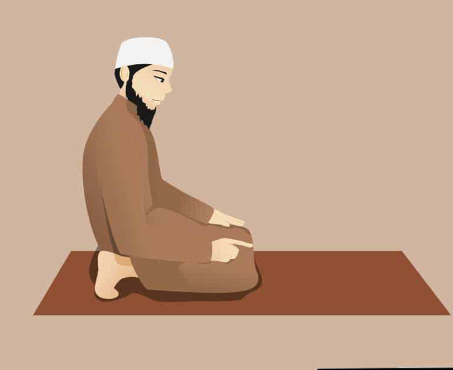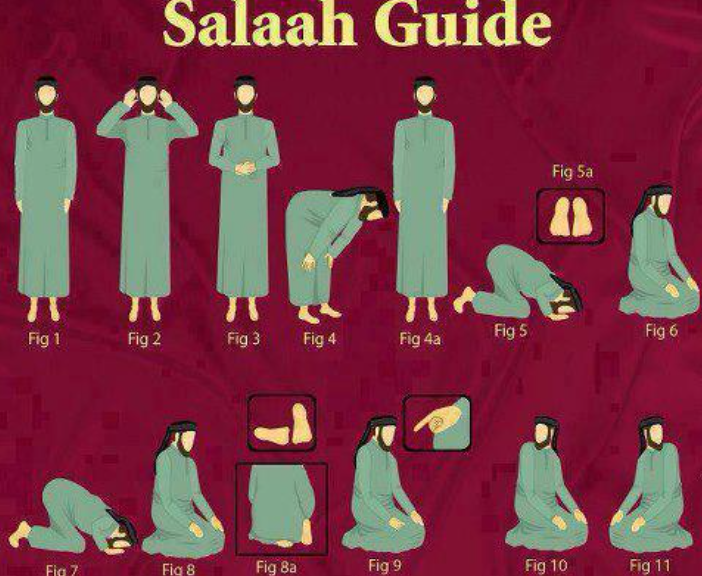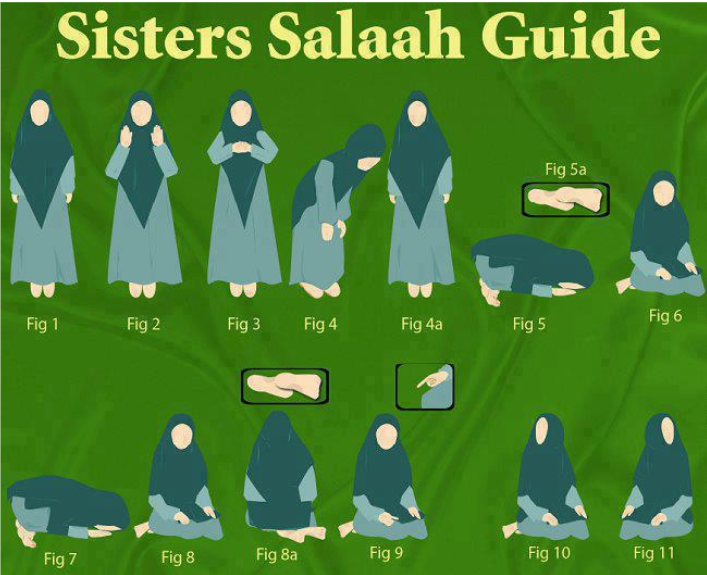
If you are looking for How to Pray Salah According to Sunnah for Men and Women, read the full article attentively.
I. Introduction-How to Pray Salah According to Sunnah for Men & Women
Prayer, or Salah, is a fundamental pillar of Islam, serving as a direct connection between individuals and their Creator. The significance of performing Salah according to the Sunnah is paramount, as it aligns with the teachings of Prophet Muhammad (peace be upon him). This article will guide both men and women on how to effectively perform Salah, adhering to the Sunnah for a more spiritually enriching experience.
Actually, Salah is a sacred act in Islam, and performing it according to the Sunnah is not just a ritual but a means to strengthen the connection with Allah. As guided by the Quran and the Sunnah (teachings of Prophet Muhammad, peace be upon him), let’s delve into how men and women can enrich their spiritual experience through Salah.
Full Guidance of How to Pray Salah According to Sunnah for Men & Women
II. Understanding Salah- How to Pray Salah According to Sunnah for Men & Women
Salah is more than a ritual; it’s a profound spiritual journey. To comprehend its importance, one must delve into its definition and recognize the obligation of the five daily prayers. These prayers act as a constant reminder of one’s faith and commitment to Allah.
Moreover, Salah, as defined in the Quran, is a direct conversation with Allah. In Surah Al-Baqarah (2:45), Allah says, “Seek help through patience and prayer.” This underscores the importance of Salah in seeking divine assistance. Read the full guidance to know How to Pray Salah according to Quran and Sunnah.
How to Perform Hajj Step by Step Complete Guidelines -2024
III. Preparing for Salah
A. Physical and Mental Preparation: Before entering the prayer, individuals should engage in physical and mental cleansing. This includes performing ablution (wudu) and focusing on the upcoming spiritual connection. Besides, The Quran encourages believers to approach Salah with a focused and tranquil mind. In Surah Al-Muminoon (23:1-2), Allah says, “Certainly will the believers have succeeded: They who are during their prayer humbly submissive.”
Further, The Quran emphasizes the obligation of the five daily prayers in multiple verses, such as in Surah Al-Ma’idah (5:55), where Allah states, “Your ally is none but Allah and [therefore] His Messenger and those who have believed – those who establish prayer and give zakah, and they bow [in worship].”
B. Choosing the Right Place: Selecting a clean and quiet space is crucial for minimizing distractions and fostering a tranquil atmosphere for Salah. And also, While the Quran doesn’t specify a particular place for prayer, it emphasizes cleanliness and sincerity. In Surah Al-A’raf (7:31), Allah urges, “O children of Adam! Take your adornment at every masjid (place of prostration).” So, Finish the full guidance to know How to Pray Salah according to Quran and Hadith.
IV. Step-by-Step Guide for Men

A. Niyyah (Intention): – In Arabic: بسم الله الرحمن الرحيم
– Translation: “In the name of Allah, the Most Gracious, the Most Merciful.” Begin with a sincere intention, acknowledging that the prayer is solely for the sake of Allah. In fact, The concept of intention is reinforced in the Quran, where Allah says in Surah Al-Insan (76:29), “And they [believers] are those who are [fully] acquainted with the purpose of their prayers.”
B. Takbir (Allahu Akbar): – In Arabic: الله أكبر
– Translation: “Allah is the Greatest.”- Meaning: This phrase is recited when starting the prayer, emphasizing the greatness and magnificence of Allah. Start the prayer by raising both hands and uttering “Allahu Akbar,” signifying the greatness of Allah. In fact, The Takbir signifies the greatness of Allah, echoing the Quranic verse in Surah Al-Ma’idah (5:6), “And when you have purified yourselves, you remember Allah.”
C. Qiyam (Standing): – In Arabic: قوموا لله قانتين
– Translation: “Stand for Allah in obedience.” Stand with humility and reverence, ready to commence the prayer. Moreover, The Quran underscores the significance of standing in prayer, as mentioned in Surah Al-Baqarah (2:238), “Guard your prayers, especially the middle prayer, and stand before Allah, devoutly obedient.”
D. Ruku (Bowing): – In Arabic: سبحان ربي العظيم
Translation: “Glory is to my Lord, the Exalted.” Meaning: Expresses the worshipper’s acknowledgment of the greatness and perfection of Allah while in the bowing position. Gently bow down, keeping the back straight and the hands on the knees. Besides, The act of bowing is beautifully illustrated in the Quran in Surah Al-Hajj (22:77), “O you who have believed, bow and prostrate and worship your Lord.”
Certainly! The Tashahhud and Durood Sharif are integral parts of the final sitting (Qa’dah) in the Muslim prayer (Salah). Here’s the full Tashahhud ,Durood Sharif and Dua Masura along with their meanings:
Please read the full guidance to know How to Pray Salah accurately according to Quran and Sunnah.
E. Sujud (Prostration): – Arabic: سبحان ربي الأعلى
– Translation: “Glory is to my Lord, the Most High.”
– Meaning: Affirms the exalted status of Allah during the prostration, symbolizing the highest level of humility and submission. Lower oneself into the prostration position, touching the ground with the forehead, nose, palms, knees, and toes. Besides,Prostration is a symbol of submission, as highlighted in Surah Al-Sajda (32:15), “Only those believe in Our verses who, when they are reminded by them, fall down in prostration and exalt [Allah] with praise of their Lord.”
Important Dua’s of Salah/ Prayer
F. Tashahhud (Testification): Conclude the prayer with the recitation of the Tashahhud, bearing witness to the oneness of Allah. In fact, The Quran emphasizes the oneness of Allah, as reflected in the Tashahhud, echoing Surah Al-Ikhlas (112:1-4), “Say, ‘He is Allah, [who is] One, Allah, the Eternal Refuge. He neither begets nor is born, nor is there to Him any equivalent.'”
G. Durood Sharif:
اللَّهُمَّ صَلِّ عَلَى مُحَمَّدٍ وَعَلَى آلِ مُحَمَّدٍ كَمَا صَلَّيْتَ عَلَى إِبْرَاهِيمَ وَعَلَى آلِ إِبْرَاهِيمَ إِنَّكَ حَمِيدٌ مَجِيدٌ، اللَّهُمَّ بَارِكْ عَلَى مُحَمَّدٍ وَعَلَى آلِ مُحَمَّدٍ كَمَا بَارَكْتَ عَلَى إِبْرَاهِيمَ وَعَلَى آلِ إِبْرَاهِيمَ إِنَّكَ حَمِيدٌ مَجِيدٌ
Pronunciation:
Allahumma salli ‘ala Muhammadin wa ‘ala ali Muhammadin kama sallaita ‘ala Ibrahim wa ‘ala ali Ibrahim. Innaka Hamidun Majeed. Allahumma barik ‘ala Muhammadin wa ‘ala ali Muhammadin kama barakta ‘ala Ibrahim wa ‘ala ali Ibrahim. Innaka Hamidun Majeed.
Translation:
O Allah, bestow Your blessings upon Muhammad and the family of Muhammad, as You have blessed Ibrahim and the family of Ibrahim. You are indeed Praiseworthy, Glorious. O Allah, shower Your mercy upon Muhammad and the family of Muhammad, as You have showered Your mercy upon Ibrahim and the family of Ibrahim. You are indeed Praiseworthy, Glorious.
Meaning:
This supplication is a prayer for blessings and mercy on the Prophet Muhammad (peace be upon him) and his family. So, it seeks Allah’s favour and grace upon the Prophet as a mark of respect and love. In Fact, It is a way for the believer to express admiration and invoke Allah’s blessings on the final Messenger.
H.Ending the Salah (Tasleem): In Arabic: السلام عليكم ورحمة الله
– Translation: “Peace and mercy of Allah be upon you.”. – Meaning: Concluding the prayer with a supplication for peace and mercy upon oneself and the entire Muslim community.
These Duas are integral parts of Salah, adding depth and spiritual significance to the prayer experience. Each supplication reflects the worshipper’s humility, gratitude, and reliance on Allah’s mercy and forgiveness.
These phrases are essential components of Salah, incorporating both Quranic verses and the teachings of Prophet Muhammad (peace be upon him). Each step in the prayer process is accompanied by specific Arabic invocations that express submission, praise, and acknowledgment of Allah’s greatness.
The Last Dua of Sslsh- Dua Masura
I. The Dua Masura, also known as the “Prayer of the Oppressed” or “Supplication of the Insolvent,” is a powerful prayer seeking Allah’s help and mercy. Here’s the English translation of Dua Masura:
Dua Masura-01 –Arabic:
بِسْمِ اللهِ الرَّحْمٰنِ الرَّحِيْمِ
اللَّهُمَّ انْصُرْنِيْ وَارْحَمْنِيْ وَاجْبُرْنِيْ وَارْفَعْنِيْ وَارْزُقْنِيْ وَاهْدِنِيْ وَعَافِنِيْ وَاجْعَلْنِيْ شَكِرًا لَكَ شَكِيْرًا مُّحْسِنًا لَّكَ مُحْسِنًا لَّكَ مُصِيْبَتًا لَّكَ وَعَبْدًا ذَلِيْلًا لَّكَ وَمَسْكِيْنًا إِلَيْكَ مُطِيْعًا لَّكَ مُخْلِصًا لَّكَ
اللَّهُمَّ اجْعَلْ لِي فِيْ قَلْبِيْ نُوْرًا وَفِيْ لِسَانِيْ نُوْرًا وَاجْعَلْ لِيْ فِيْ سَمْعِيْ نُوْرًا وَاجْعَلْ لِيْ فِيْ بَصَرِيْ نُوْرًا وَاجْعَلْ لِيْ مِنْ خَلْفِيْ نُوْرًا وَمِنْ اَمَامِيْ نُوْرًا وَاجْعَلْ لِيْ مِنْ فَوْقِيْ نُوْرًا وَمِنْ تَحْتِيْ نُوْرًا
اللَّهُمَّ اجْعَلْنِيْ اعْلَمُ بِمَا يُنْفَعُنِيْ وَاجْعَلْنِيْ عَامِلًا بِهٖ وَتَوَكَّلْتُ عَلَيْكَ يَا رَبُّ الْعٰلَمِيْنَ
Transliteration/Pronunciation:
Bismillah hir Rahman ir Rahim,
Allahumma insurni warhamni wajburni wa rif’ani warzuqni wahdini wa’afini waj’alni shakiran laka shakira muhsinan laka muhsina lika musibatan laka wa’abdun zallila laka wa maskeenan ilayka muti’an laka mukhlisan laka, Allahumma ij’al li fi qalbi nuran wa fi lisani nuran wa ij’al li fi sami’i nuran wa ij’al li fi basari nuran wa ij’al li min khalfi nuran wa min amami nuran wa ij’al li min fawqi nuran wa min tahti nuran.
Allahumma ij’alni a’lamu bima yunfa’uni wa ij’alni ‘amilan bihi wa tawakkaltu ‘alayka ya Rabbal ‘Alamin.
Translation:
In the name of Allah, the Most Gracious, the Most Merciful.
O Allah, help me, have mercy on me, strengthen me, lift me, provide for me, guide me, grant me safety, make me grateful to You, a grateful servant to You, a doer of good for You, afflicted for You, a humble servant to You, and a destitute one returning to You, obedient to You, and sincere to You.
Then, O Allah, place in my heart light, in my tongue light, in my hearing light, in my sight light, behind me light, in front of me light, above me light, and beneath me light.
And then, O Allah, make me aware of what benefits me and make me act upon it. I place my trust in You, O Lord of all the worlds.
There are many Dua Masura. You Can Choose Anyone.
Dua Masura-02
Certainly! The phrase “Allahumma inni jalamtu nafsi” is not a specific Dua Masura but rather a supplication that translates to “O Allah, I have wronged myself.” Here’s the Arabic text and its meaning:
Arabic:
اللهم إني ظلمت نفسي ظلمًا كثيرًا ولا يغفر الذنوب إلا أنت فاغفر لي مغفرةً من عندك وارحمني إنك أنت الغفور الرحيم
Transliteration/Pronunciation::
Bismillah hir Rahman ir Rahim,
Allahumma inni zalamtu nafsi zulman kathiran wa la yaghfiru al-dhunuba illa anta faghfir li maghfiratan min ‘indika warhamni innaka anta al-ghafur al-rahim.
Translation/Meaning:
O Allah, I have wronged myself greatly, and no one forgives sins except You. So forgive me with forgiveness from You and have mercy on me. Surely, You are the Most Forgiving, Most Merciful.
This supplication reflects a sincere acknowledgment of one’s own shortcomings and a plea for Allah’s forgiveness and mercy. It is a humble recognition of the individual’s mistakes and a heartfelt request for Allah’s pardon, emphasizing His attributes of forgiveness and mercy.
V. Step-by-Step Guide for Women

You should read the full guidance to know How to Pray Salah for women according to Quran and Sunnah.
A. Modesty and Attire: Women should wear modest clothing, covering their bodies appropriately, and perform Salah in a secluded space. Besides,
The Quran encourages modesty in attire for both men and women. In fact, Surah Al-Ahzab (33:59) guides, “O Prophet, tell your wives and your daughters and the women of the believers to bring down over themselves [part] of their outer garments.”
B. Niyyah and Takbir: Similar to men, women should begin with a sincere intention and the Takbir. Besides, Women share the same intention and Takbir principles as men, as emphasized in the Quranic verse in Surah Al-Baqarah (2:197), “And take provisions, but indeed, the best provision is Taqwa (piety, righteousness).”
C. Modifications in Physical Movements: While the essence of the prayer remains the same, certain modifications accommodate the physical differences between men and women. Moreover, While the essence of Salah remains consistent, the Prophet Muhammad (peace be upon him) made allowances for physical differences between men and women, ensuring comfort without compromising the core actions.
VI. Common Mistakes in Salah
A. Rushing Through Prayers: Many individuals hurriedly perform Salah, neglecting the serenity it demands. In fact, The Quran warns against hastiness in prayer in Surah Al-Ma’arij (70:19-23), “Indeed, mankind was created anxious: When evil touches him, impatient, And when good touches him, withholding [of it].”
B. Lack of Concentration: Distractions can lead to a lack of focus during prayers, diminishing their spiritual impact. Moreover, The Quran advises on focused worship in Surah Al-Araf (7:204), “And when the Qur’an is recited, give ear to it and pay heed, that ye may obtain mercy.”
C. Incorrect Pronunciation: Mispronouncing the Arabic verses can alter the meaning of the prayer; hence, correct pronunciation is crucial. And next, Pronouncing the verses correctly is crucial, as mispronunciation can alter meanings. Allah instructs in Surah Al-Baqarah (2:121), “Those to whom We have given the Book recite it with its true recital.”
VII. Benefits of Praying According to Sunnah
A. Spiritual Connection: Following the Sunnah enhances the spiritual connection between the worshipper and Allah. Besides,The Quran promises a strengthened connection with Allah through consistent and sincere prayer. Surah Al-Muminun (23:1-2) reinforces this, “Certainly will the believers have succeeded: They who are during their prayer humbly submissive.”
B. Mental Well-being: Consistent adherence to Sunnah prayers contributes to mental peace and tranquility. Moreover, Surah Ar-Ra’d (13:28) highlights the tranquility gained through remembrance of Allah, “Those who have believed and whose hearts are assured by the remembrance of Allah. Unquestionably, by the remembrance of Allah, hearts are assured.”
C. Community Bond: Salah performed in congregation strengthens the bond within the Muslim community. Furthermore, The Quran encourages communal worship, as stated in Surah Al-Baqarah (2:43), “And establish prayer and give zakah and bow with those who bow [in worship and obedience].”
VIII. Overcoming Challenges
A. Time Constraints: Balancing a busy schedule requires effective time management to prioritize Salah. In fact, The Quran acknowledges life’s demands but urges prioritizing Salah. Surah Al-Ma’arij (70:19-23) cautions against letting worldly pursuits hinder spiritual obligations.
B. Distractions: Creating a serene environment and minimizing external disturbances is essential for focused prayer. Surah Al-Muminoon(Believers) (23:2) encourages a state of humility and submission during prayer, aiding in overcoming distractions.
C. Consistency: Establishing a consistent prayer routine aids in overcoming the challenges of maintaining Sunnah Salah. Surah Al-Baqarah (2:197) emphasizes consistency in Taqwa (piety), acknowledging it as the best provision for the spiritual journey.
IX. Personal Experiences- How to Pray Salah According to Sunnah for Men & Women
Now you need to read the full guidance of personal experience to know How to Pray Salah according to Quran and Sunnah.
A. Testimonials: Individuals share transformative experiences and the positive impact of incorporating Sunnah prayers into their lives. Besides, Surah Al-Hajj (22:77) encourages believers to share their transformative experiences, “O you who have believed, bow and prostrate and worship your Lord and do good – that you may succeed.”
B. Transformative Stories: Narratives of individuals whose lives were positively changed through dedicated Sunnah Salah practices. Besides, Surah Al-Hajj (22:77) encourages believers to share their transformative experiences, “O you who have believed, bow and prostrate and worship your Lord and do good – that you may succeed.”
Conclusion
In conclusion, Salah according to the Sunnah is a transformative experience that goes beyond a routine obligation. By following the outlined steps and avoiding common mistakes, individuals can enhance their spiritual journey and enjoy the numerous benefits associated with these prayers and you will also know how to pray Salah accurately. However, Salah according to the Sunnah is deeply rooted in the Quranic guidance and the practices of Prophet Muhammad (peace be upon him). So, by following these steps and considering the Quranic teachings, individuals can elevate their spiritual journey and experience the profound impact of Salah on their lives. In addition, Besides this article, How to Pray Salah according to Quran and Sunnah, You will find many other Islamic Content in our Website infohouse24.com.
# FAQs(Frequently Asked Questions)-How to Pray Salah According to Sunnah for Men & Women
1. Can I perform Sunnah prayers at any time of the day?
– While Sunnah prayers are recommended, they are particularly emphasized at specific times of the day.
2. Are women allowed to pray in the mosque?
– Yes, women are allowed to pray in the mosque, but they are encouraged to pray at home for added privacy.
3. How long should one spend in each position during Salah?
– The duration of each position in Salah varies, but maintaining a steady and focused pace is crucial.
4. What should I do if I miss a Sunnah prayer?
– If a Sunnah prayer is missed, it can be made up later, but consistency is encouraged for spiritual growth.
5. Can I combine multiple prayers if I’m short on time?
– While there are exceptions, it is generally advised to perform prayers at their designated times to fully benefit from the spiritual experience.